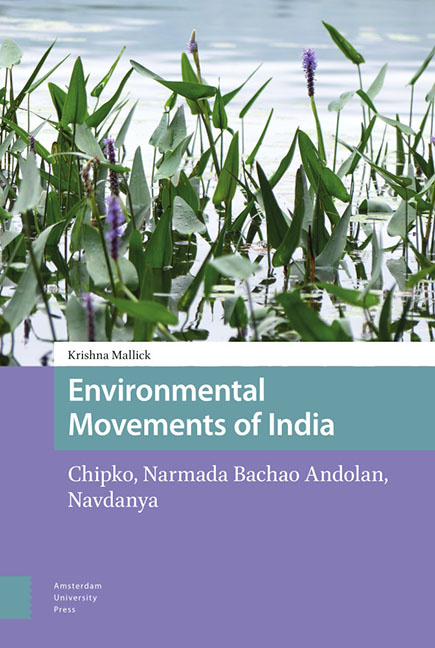Book contents
- Frontmatter
- Dedication
- Contents
- Acknowledgments
- Foreword
- Glossary
- Introduction: Three Grassroots Movements That Made a Global Impact
- 1 Historical and Cultural Contexts in India
- 2 Chipko (Hug the Trees) Movement
- 3 Narmada Bachao Andolan (NBA): Save the Narmada
- 4 Navdanya (Nine Seeds) Movement
- 5 Moral Implications of Environmental Movements
- 6 Hindu Ethics and Ecology
- Conclusion: The Symbiosis of Natural Resources and Local Needs
- Index
6 - Hindu Ethics and Ecology
Published online by Cambridge University Press: 13 November 2021
- Frontmatter
- Dedication
- Contents
- Acknowledgments
- Foreword
- Glossary
- Introduction: Three Grassroots Movements That Made a Global Impact
- 1 Historical and Cultural Contexts in India
- 2 Chipko (Hug the Trees) Movement
- 3 Narmada Bachao Andolan (NBA): Save the Narmada
- 4 Navdanya (Nine Seeds) Movement
- 5 Moral Implications of Environmental Movements
- 6 Hindu Ethics and Ecology
- Conclusion: The Symbiosis of Natural Resources and Local Needs
- Index
Summary
Abstract
This chapter provides a detailed analysis of Hinduism, examining some popular Hindu scriptures in which the interconnectedness of humans and nature are depicted and noting how these scriptures are used only selectively by the general population of India without much attention being paid to the environmental crisis. The analysis demonstrates that Hinduism has a metaphysical basis for ethical guidance and that Hindu ethics based on dharma with its many levels – the universal and the particular (based on one's status, caste, and family) in contrast to ethics viewed at the universal level in the Western context – can be viewed as the foundation of environmental sustainability. Following an extensive review of the literature, it is argued that Hindu scriptures should be the basis of reducing the environmental damage caused by humans.
Keywords: stages of Hinduism, dharma, ethics, religious environmentalism, Advaita and Vishistadvaita Vedanta
Whether or not the environmental movements of India have their philosophical foundations in the ethics of Hinduism has been open to debate. Some scholars argue that although there are many philosophical ideas proposed in different scriptures of Hinduism, the environmental movements are not based on those philosophical and ethical ideals. They claim that environmental movements are basically concerned with issues related to the livelihood of the people who are directly affected and to how they are treated by others. Other scholars counter that there is a connection between Hindu ethics and sustainability and that Hindu ideals should be reinstated in the sustainability discourse. The focus of this chapter is to try, like Bilimoria (1998), ‘to identify patterns of ideas which may complement the history of environmental thinking’ (p. 1). By analyzing the pivotal views of experts in the field of religious environmentalism, I will show how the complexities of Hindu ethics have evolved over the centuries and how it is related to sustainability in the present context, particularly since the emergence of the interdisciplinary subfield of religious environmentalism in the 1990s. A variety of philosophical and ethical ideas of Hinduism are explored that may relate to sustainability.
- Type
- Chapter
- Information
- Environmental Movements of IndiaChipko, Narmada Bachao Andolan, Navdanya, pp. 143 - 174Publisher: Amsterdam University PressPrint publication year: 2021



